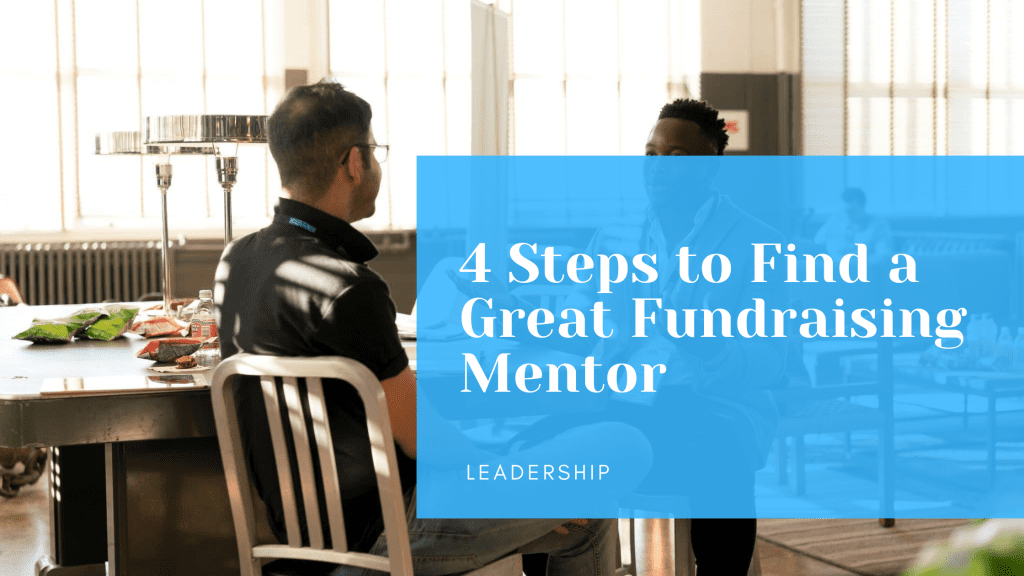Mentorship is widely considered as an important step in any leadership development journey. In the nonprofit sector, having a great mentor can have an even more profound effect given the unique challenges faced by fundraising leaders. But how do you find a fundraising mentor that’s right for you? Follow these steps to find a great fundraising mentor.
1. Define your goals.
Before you start your search for a mentor, it’s important to take some time to yourself to think about what you hope to gain from the relationship. What areas of your work would you like help with? Are there any specific skills you’d like to develop? By taking the time to answer these questions, you’ll be better equipped to find a mentor who can help you achieve your goals.
Mentorship is a complex and often misunderstood concept. At its core, mentorship is about developing a relationship between two people in which the mentor provides guidance, support, and advice to the mentee. But mentorship can take many different forms, and it’s important to understand what type of mentor-mentee relationship will best suit your needs before you embark on this journey.
There are three key types of mentoring relationships:
- The traditional mentor-mentee relationship in which the mentor is older and more experienced than the mentee. This type of relationship is often used to transfer knowledge from one generation to the next.
- The peer-to-peer mentoring relationship in which both parties are at similar stages in their careers. This type of relationship is often used to provide support and advice around specific challenges or transitions that both parties are facing.
- The reverse mentor-mentee relationship in which the mentee is older and more experienced than the mentor. This type of relationship is often used to help the mentor gain new skills or perspectives.
 It’s important to understand that there is no right or wrong answer when it comes to choosing the type of mentoring relationship that’s right for you. The most important thing is to be clear about your goals for mentoring and to select a type of relationship that will best help you achieve those goals.
It’s important to understand that there is no right or wrong answer when it comes to choosing the type of mentoring relationship that’s right for you. The most important thing is to be clear about your goals for mentoring and to select a type of relationship that will best help you achieve those goals.
Here are three questions to ask yourself as you start to define your goals for mentoring:
- What do I hope to achieve through mentorship?
- What value can I offer my mentor?
- What kind of relationships do I want to develop?
Answering these questions will help you put together a clear plan for what you want to achieve through your mentoring relationships. It will also help you identify what type of mentor-mentee relationship will best fit your needs. And finally, it will help you find mentors who can provide guidance and support around your specific goals. So don’t delay — get started today!
2. Do your research.
When you’re looking for a mentor, it’s important to do your research. A mentor can help you advance your career, provide useful advice, and introduce you to new opportunities. But how can you be sure you’ve found the right mentor for you?
Once you’ve identified your goals, it’s time to start your search for potential mentors. Talk to friends and colleagues in the industry and see if they have any recommendations for people who might be a good fit. You can also look for leaders of organization similar to yours who may be open to mentoring relationships. Additionally, LinkedIn is a great resource for finding potential mentors as it allows you to filter your searches by location, industry, and more.
One of the best ways to find a mentor is through LinkedIn. LinkedIn is a professional networking site with over 500 million members in over 200 countries. And because it’s such a popular platform, there’s a good chance that your potential mentors are already on LinkedIn. Here’s how to use LinkedIn to find a fundraising mentor:
Start by doing a search for “nonprofit fundraising” or “development.” You can also try searching for specific keywords like “donor relations,” “annual giving,” or “capital campaigns.” Once you’ve performed your search, take a look at the results and see if any of the profiles stand out to you. When you find someone who looks like a good fit, send them a connection request and include a note letting them know that you’re interested in finding a mentor in the fundraising field.
Another great way to find potential mentors is to join LinkedIn groups related to nonprofit fundraising. There are dozens of groups dedicated to topics like annual giving, donor relations, or major gifts—and many of them have active discussions where members share advice and expertise. By joining one (or more) of these groups, you’ll be able to connect with potential mentors and start building relationships.
Finally, don’t forget to reach out to your own network of contacts—including family, friends, and colleagues—to see if they know anyone who might be willing to mentor you. Many people are more than happy to help out someone who’s just starting out in their career, so don’t be afraid to ask for help!
3. Reach out and introduce yourself.
Once you’ve identified a few potential mentors, reach out and introduce yourself! Explain why you’re interested in mentoring relationship with them and what you hope to gain from it. Be sure to mention any relevant experience or skills that would make you a good mentee. If they’re open to the idea of mentoring you, then set up a time chat so that you can get to know each other better and discuss expectations for the relationship.
Prepare an elevator pitch
An elevator pitch is a short, concise summary of who you are and what you’re looking for in a mentor relationship. This is your opportunity to sell yourself and make a good first impression, so take some time to prepare in advance. Think about what makes you unique and what assets you bring to the table. Keep it short, sweet, and to the point.
Reach out and make your request
Once you’ve done your research and prepared your elevator pitch, it’s time to reach out to your potential mentor and make your request. The best way to do this is usually via email or LinkedIn message. Keep your message polite, professional, and straightforward. In your email or message, briefly introduce yourself and explain why you’re interested in working with them as your mentor. Then, attach your resume or CV so they can get to know you better. Finally, thank them for their time and let them know how they can reach you if they’re interested in mentoring you.
Follow up
If you don’t hear back from your potential mentor right away, don’t despair! It’s perfectly normal for people to need some time to think about such requests. Follow up with them after a week or two with a brief email or message checking in on their decision. They may appreciate the reminder and be more likely than before to say yes!
4. Stay in touch and keep growing!
Once you’ve found a mentor, it’s important to nurture the relationship by staying in touch and continuing to grow as a fundraiser leader. Check-in with your mentor on a regular basis (monthly or quarterly) and let them know about any successes or challenges you’re facing at work. Offer help when they need it and be sure show your appreciation for their guidance! Your mentor can provide invaluable guidance, support, and advice – but only if the relationship is strong. Here are four tips for keeping your bond with your mentor strong.
1. Communication is key.
Mentors are busy people, and it can be difficult to get their attention. However, it’s important to communicate openly and frequently with your mentor. Keep them updated on your progress, and let them know when you need their help. The best relationships are built on two-way communication.
2. Show your appreciation.
Remember to show your appreciation for everything your mentor does for you. A simple thank-you goes a long way – but you can also show your gratitude by being a great mentee. Be punctual, prepared, and willing to put in the work. And don’t forget to keep them updated on your successes!
3. Offer help in return.
A good mentee knows that mentoring is a two-way street. While your mentor may be more experienced than you are, that doesn’t mean you can’t offer help in return. Share your own knowledge and experiences, and be open to offering advice when asked.
4. Respect their time and boundaries.
Remember that your mentor is volunteering their time to help you – so respect their time and boundaries. Don’t monopolize their time or ask for more than they’re willing to give. If they say no to meeting or helping you with something, don’t take it personally – just thank them for their time and move on.
A mentorship relationship can be an incredibly powerful tool for developing new skills and insights as a fundraiser leader— but only if it’s the right fit for both parties involved. By taking the time to define your goals, do your research, reach out and introduce yourself ,and stay in touch,you’ll be on your way towards finding the perfect fundraising mentor for you!



